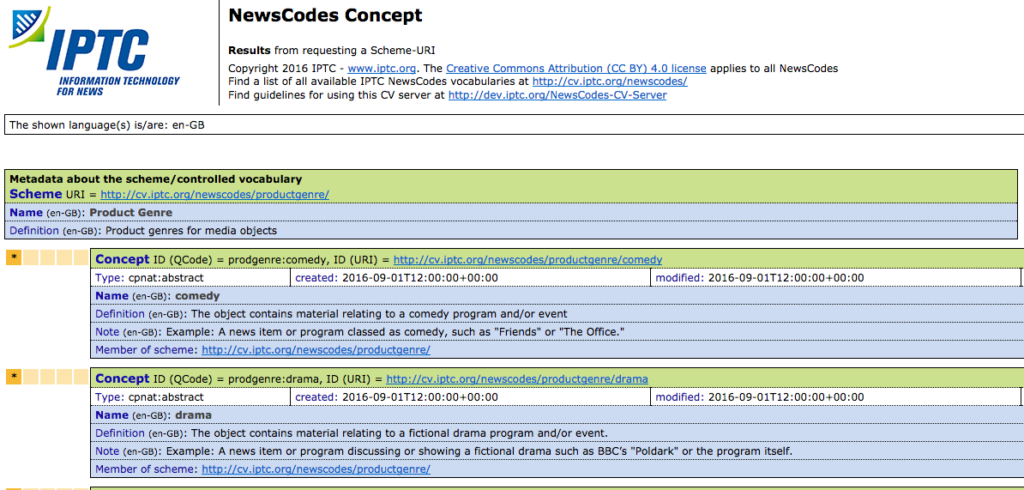Categories
Archives
The IPTC NewsCodes family of controlled vocabularies has a new member: Product Genre.
The Product Genre vocabulary was developed at the request of the broadcast industry. A broad category of terms was needed – one that specifies the kind of content by media product type – in addition to metadata that describes the content. The Product Genre scheme includes terms such as comedy, drama, entertainment, travel and sport.
NewsCodes are sets of concepts created and maintained by the IPTC, also known as controlled vocabulary or taxonomy. They are assigned as metadata values to news objects like text, photographs, graphics, audio and video files and streams. This allows for a consistent coding of news metadata across news providers and over the course of time.
The Product Genre vocabulary was an idea initiated by Andy Read, IPTC delegate and BBC’s Service Development and Delivery Manager for News, who has worked with IPTC for more than 20 years. This was based on feedback from broadcast members that highlighted the value of the forum engagements in driving the progression of the data set.
“There was a need to extend the breadth of the controlled vocabularies,” said Read. “The new Product Genre vocabulary codes describe the type of program itself, and help to broaden the program to a wider audience and general TV/broadcast industry.”
NewsCodes vocabularies can be very specific. A broader category like Product Genre allows identification of an entire broadcast program or package – not just smaller segments. For example, a longer 60-minute program overview about Syria’s war can be coded according to Product Genre – supplemented by metadata specific to a minute-long clip about a possible chemical attack, in the context of the larger news program.
“The Product Genre needed to be added to help facilitate use of these codes with IPTC’s NewsML-G2 standards,” said Read.
The new Product Genre vocabulary is also beneficial on the business side, said Jennifer Parrucci, senior taxonomist for the New York Times.
“Advertising is often sold based on the type of program – not necessarily subject tags or more specific terms,” Parrucci said. “The Product Genre vocabulary identifies advertising opportunities at a more comprehensive level.”
The IPTC NewsCodes Working Group, chaired by Parrucci, collaborated to define the vocabulary terms, based on concrete examples and actual TV programs. For each Concept identifier and name, a definition is listed. The notes section gives an example of what that Concept describes, for clarity and accurate use.
Any NewsCode provided by the IPTC can be used at any stage of a news workflow, without any royalty fee. But if one includes IPTC NewsCodes into an application, the intellectual property and the copyright of the IPTC must be explicitly attributed.
More information:
Product Genre terms and definitions
IPTC NewsCodes and other vocabularies
Tree diagrams: IPTC NewsCodes and groups.
Questions? Contact us.
Twitter: @IPTC
LinkedIn: IPTC
More information: Attend IPTC’s Autumn 2016 meeting, IPTC.org.
Questions? Feel free to contact me or IPTC Managing Director Michael Steidl.
Twitter: @IPTC
LinkedIn: IPTC


